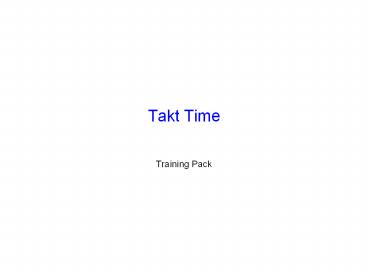Takt Time - PowerPoint PPT Presentation
Title:
Takt Time
Description:
Takt Time. Takt is a German word. It is the principal that all activity within ... Target Cycle Time = The pace at which we will produce to ensure we meet the ... – PowerPoint PPT presentation
Number of Views:7529
Avg rating:3.0/5.0
Title: Takt Time
1
Takt Time
- Training Pack
2
Which of these is Important to Our business?
- Satisfied Customers
- Profit
- Growth
- Market Share
- Effective use of its people and plant
- Maximum Capacity Production
3
Why Not Maximum Capacity?
Producing more than the customer requires is
This is the greatest of the Seven Wastes As it
leads to occurrence of the other six
4
The Western Approach
We produce more than we require to allow for
problems
3
2
1
This embeds waste in our business
5
Push Production System
If we consider production operations as a chain
?
Each link producing in isolation at full speed
will cause a mismatch between links Some areas
over-produce, some cannot keep up...
6
Push Production System
What will happen when a link in the chain
breaks Within a Push System?
7
Push Production System
The individual links keep building to schedule
and
Customer
The chain soon backs up
8
Push Production System
When we consider the wider system
Customer
STOCK / WIP
We see why stock is present. To buffer the
unevenness of work To buffer the breaks in the
chain
9
Just In Time
The Just in Time branch of the Lean Production
System is constructed of four key elements
10
Takt Time
Takt is a German word
It describes the conductors baton
It is the principal that all activity within a
business is synchronised by a pulse, set by the
customer demand
11
Takt Time determines
The pulse of the Production System
- Pace of sales
- Links production activity to actual customer
demand
- Ensures all production activity will be
synchronised - from 1st process to final assembly process. -
FLOW
12
How To Calculate Takt Time
Takt time relates the customer demand to the time
available. Takt Production Time Available
Customer Demand Time is deducted
for Lunch and tea breaks Team briefing
times TPM breaks Clean down time E.g
8hrs x 60 480 minutes Time Available 480
20 mins breaks 10 mins TPM 450mins
13
How To Calculate Takt Time
If the customer demand is 500 units per
week Demand 500 / 5 100 products a
day Takt Time Time Available Customer
Demand 450 mins 100 4.5 mins or 270
secs
14
Takt, Cycle, Target Cycle and Lead Time
Takt Time The pace at which the customer
requires products Target Cycle Time The
pace at which we will produce to ensure we
meet the customer requirements Cycle
Time The time at which a process cycles Lead
Time The total production lead time from
product start to finish
Dont get them confused!!
15
Takt, Cycle, Target Cycle and Lead Time
Cycle Time
Takt Time
Target Cycle Time
Lead Time
16
Flow Production
The customer takes a product from the end Of the
chain
Each link in the chain takes from the previous
link And processes produce to fill the gap that
has been created
What will happen when a link in the chain breaks
17
Flow Production
If a link in the chain breaks... The chain stops.
If the Customer does not pull from the end...
The chain stops.
18
Takt Time, an enabler for Flow
If work balance is set to Takt, the process
closest the customer can pull production through
the system at the right pace. This includes
material delivery. This pull removes the
requirement for scheduling at each stage, and
hence the buffer stocks and Work In Progress that
populate the Push Process Chain.
19
Takt, an Enabler for Work Balance
OP No
Time
Step
No
Work Description
Work
Walk
C01
2
3
2
Mug Tree
Obtain Spoon
2
C02
Put Coffee in Mug
8
C03
1
Coffee
2
4
C04
Boiler
2
4
Fridge
2
2
4
2
4
14
C05
3
6
Pick up Mug
2
C06
2
5
3
Return
5
7
TOTALS
45
18
63
20
Takt, an Enabler for Work Balance
Time Available 480mins - 30mins breaks -
10mins team meeting
21
Takt, an Enabler for Work Balance
C06
C05 (Add Water)
Value Added
Add Milk
C04
Non Value Added
C03 (Add Coffee)
C02
C01
22
Takt, an Enabler for Work Balance
Customer Demand 20 380 mugs / day to 456 mugs
/ day
How do we use this information to meet
our customer demand?
Add 20 more workers?
Run 20 Overtime?
Contract out 76 cups of coffee to a supplier?
Use Takt to drive waste elimination
23
Takt, an Enabler for Work Balance
24
Takt, an Enabler for Work Balance
Takt for 380 mugs / day
C06
C05
C04
C03
C02
C01
Value Added
25
Takt, an Enabler for Work Balance
Op No
Time
Step
No
Work Description
Work
Walk
C01
2
3
2
Mug Tree
Obtain Spoon
2
C02
Put Coffee in Mug
8
C03
1
Coffee
2
4
C04
Boiler
2
4
Fridge
2
2
4
2
4
14
C05
3
6
Pick up Mug
2
C06
2
5
3
Return
5
7
TOTALS
45
18
63
26
Work Balance
Work Package Progress Tracker
WORKPACKAGE 1 PACKAGE PROGRESS TRACKER
Task Description
Cycle Time
Unit
Start date
Start Time
Target finish
Operator
Takt Time
A work package progress tracker will be used to
monitor how the unit build is progressing against
takt and drive corrective action
27
Takt Time
We know why conventional western methods will
make our business unprofitable
REMEMBER WASTE, ITS DOOM
28
Takt Time
TAKT TIME
Enables work-balancing
Enables Flow
WASTE
Driving out waste within our business































